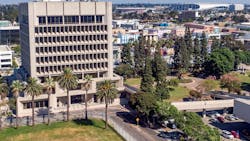Inglewood Transit Connector Project receives $1 million in federal funding
The Inglewood Transit Connector (ITC) Project has received $1 million in federal funds, moving the project an important step toward full funding. The project has also been approved for entry into the Engineering phase of project development under the Federal Transit Administration’s (FTA) Capital Investment Grant (CIG) program and represents a commitment from FTA to cover 50 percent of the anticipated total cost of the project.
The approval for entry into the Engineering phase is the second-to-last step in the FTA’s project evaluation process. It represents the FTA’s recognition of the financial, management and technical capacity of the ITC Joint Powers Authority (JPA), a partnership between the city of Inglewood and Los Angeles County Metropolitan Transportation Authority (L.A. Metro). FTA gave a positive rating for the project after reviewing the project’s costs, its potential for strong ridership and the strong community support that the project enjoys.
“This is a good day for the people of Inglewood and the entire region,” said Inglewood Mayor James T. Butts. “By signaling their commitment to invest significantly in our project, the federal government is recognizing the importance of providing better transportation options for our residents and to everyone in our region who wants to work and visit our city and its outstanding sports, entertainment and commercial facilities. We owe a debt of gratitude, not only to the Biden Administration, but also to U.S. Sen. Alex Padilla (D-CA), the late Sen. Dianne Feinstein (D-CA), USDOT and FTA leadership, as well as Gov. [Gavin] Newson, Assemblywoman Tina McKinnor (D-CA) and other state and local partners. I want to acknowledge the L.A. Metro Board of Directors, CEO Stephanie Wiggins, Mayor Karen Bass of Los Angeles, the County Board of Supervisors and my fellow mayors across the South Bay. We have collectively aligned around one goal – making sure those coming and going to Inglewood have the optimal experience through a modern transit solution that serves fans, employees, visitors and residents alike.”
"I applaud the Biden Administration's plan to commit federal funding for the Inglewood Transit Connector project," said Sen. Padilla. "This action delivers on the promise of the Bipartisan Infrastructure Law to support communities whose transit infrastructure has been neglected for too long and who have been impacted negatively by the construction of major freeways like the I-405 in Inglewood."
The ITC, a proposed 1.6-mile automated people mover, will address a “first/last” mile transportation gap between the L.A. Metro K Line and Inglewood’s new major employment and destination centers, including the Kia Forum, Sofi Stadium, YouTube Theater, the Intuit Dome, as well as the housing and commercial destinations in the surrounding area. The ITC will connect Inglewood residents to the L.A. Metro transit system, linking riders from across L.A. Metro’s existing 100-plus miles of rail to Inglewood. The ITC is being designed to carry up to 11,000 riders per hour to the approximately 400 annual events that occur in the Sports and Entertainment District and provide daily service to thousands of other commuters and visitors.
“Los Angeles is planning and preparing to be on the world’s stage for years to come. When our federal partners lock arms with us and commit resources to delivering important infrastructure projects, we can deliver for our communities and connect more people to good-paying jobs and world-class destinations. This announcement is an important step in that process and I want to recognize Mayor of Inglewood James Butts for his leadership and vision,” said Los Angeles Mayor and L.A. Metro Board Chair Karen Bass.
To date, the project has already secured $873 million in local, state and federal funds. The city of Inglewood and JPA will work to leverage those committed funds and the CIG grant to close a narrowing gap in construction, maintenance and operating costs.
In addition to securing the federal funds, the ITC team is in the process of securing a team to implement the project. Three prequalified teams are now preparing bids, with a best value proposer anticipated to be chosen in summer 2024. Pending the assemblage of all necessary project funding, the JPA will then authorize design and construction to begin.
